Historically, much of Roman philosophy inherits its precepts, instructions, exhortations, and observations from its predecessor, the ancient Greek philosophy, which is the cradle of philosophy itself.
Theories of existence and ethics have been advanced and argued by learned scholars, even martyred for their love of knowledge throughout the ancient Greek period. Philosophers such as Socrates, Aristotle, and Plato are some of the Fathers of Philosophy.
Chiefly inspired and adapted from Stoic, Academic, and Epicurean schools, the primary impressions date back to 155 BCE from an embassy of Greek philosophers who had visited Rome.
Although the foundation of Roman philosophy lies in the political upheavals of Greece and subsequent thoughts, ideas, inquiries, and opinions of the Greek philosophers, Roman philosophers have tremendously influenced the annals of Western philosophy.
Initially faced with hesitation and resistance, these tenets went on to be intrinsically bound with Roman philosophy, all thanks to some of the most noted authors, scholars, intellectuals, and philosophers of Rome.
This article enlists the top ten philosophers who deciphered the core doctrines of Greece and gradually adopted them into what we now know as Roman Philosophy.
10. Hypatia (370-415)
Content
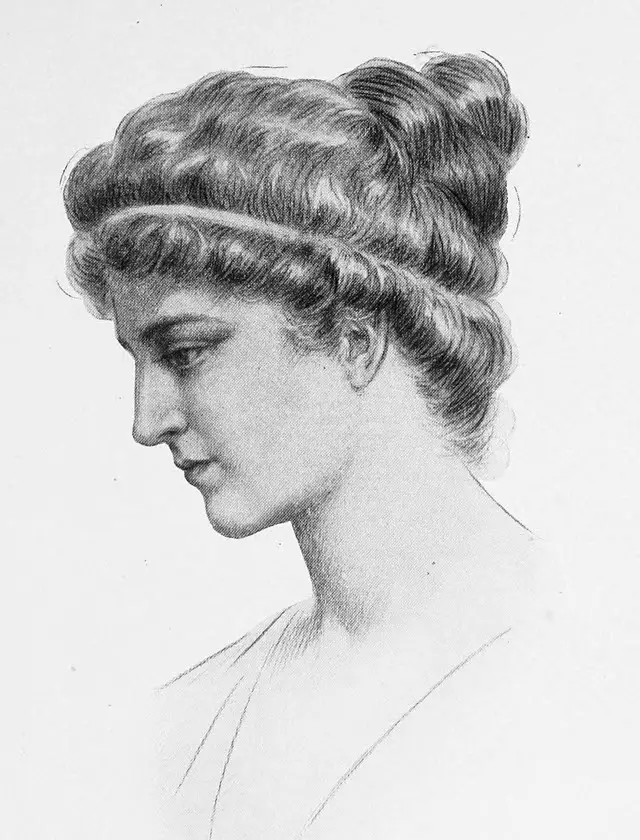
Hypatia, a Neoplatonist philosopher, was also a pioneer and a significant contributor to mathematics.
Born to Theon, who was also a gifted mathematician and philosopher, Hypatia undertook to teach the philosophies of Neo-Platonism expounded by Plotinus and Iamblichus. The former was the father of Neo-Platonist ideology and the latter was of Arab origin, leading the movement in Syria.
When the practices of the West were fraught with Pagans and Paganism, she brought in the concept of knowledge and science.
Her philosophy was more scholarly and scientific in its interest and less mystical and pagan than that of Neoplatonism in other schools. Later, she succumbed to death in the throes of violent conflict between the Christians and the Pagans.
9. Anicius Manlius Severinus Boethius (470/75-524)
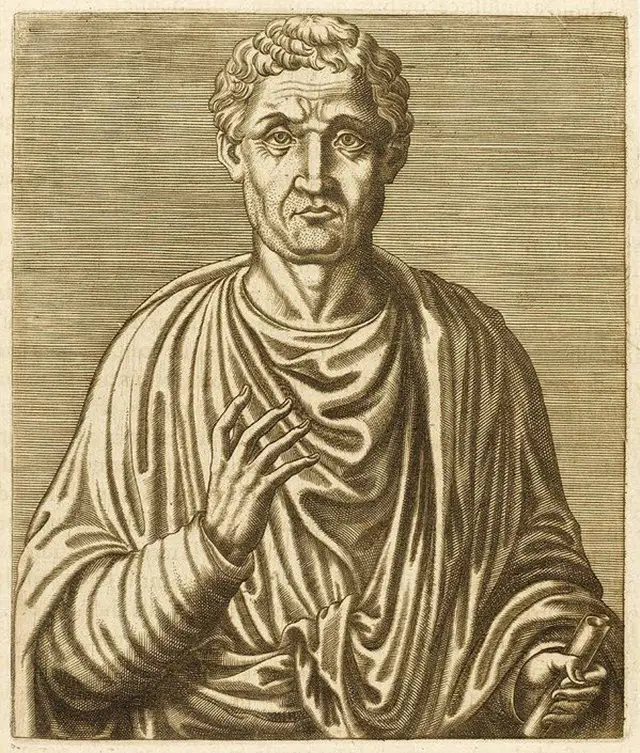
Boethius was a Roman scholar, a Christian philosopher, and a statesman. His exclusive work on Neo-Platonism, De Consolatione Philosophiae (Consolation of Philosophy) catapulted him to the heights of authorship. In his book, he opines that true happiness is the sacred union of wisdom and Divine Love.
It was his scholarly aim to translate the logic of Aristotle in Greek into Latin and the complete works of Plato with additional commentary, notes, and glosses.
Convicted for openly defending senator Albinus, other charges were the practice of magic and sacrilege. It was during his time of imprisonment that he wrote his distinguished and most personal work, Consolation of Philosophy. The philosophical arguments he presented is Platonic with a hint of literary art.
Thus, it followed his execution in 524 with awaiting virtuous reward at the other side of the death being his only hope.
8. Lucretius (BC 88- BC 55)
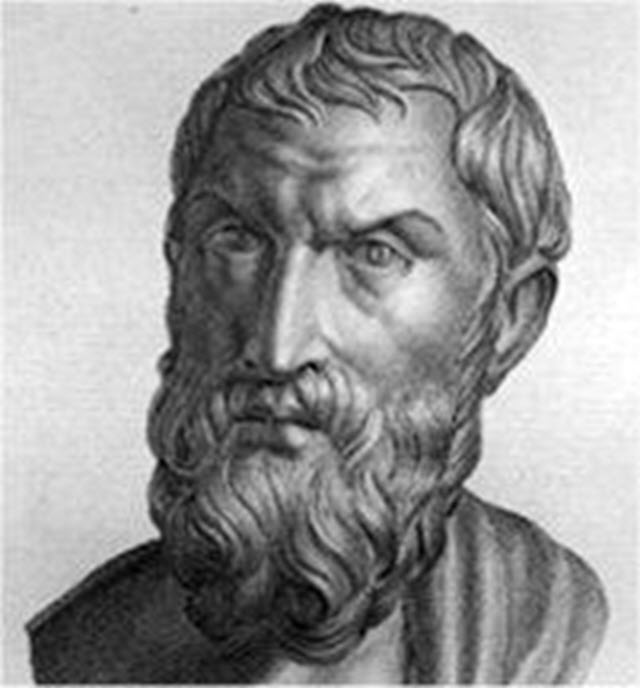
Lucretius or Titus Lucretius Carus is one of the most underrated of Roman poets and philosophers. A zealous follower of Epicurius, there is not much we know about him.
His only work surviving in our memory is the dactylic philosophical poem, De Rerum Natura (On the Nature of Things) about the main ideas and core philosophy of Epicureanism. The only known fact to testify his existence is that he was a companion or client of Gaius Marius to whom his poem was addressed and dedicated.
His poems grope every tangible and intangible phenomenon such as the mind and soul, sensations, touch, thoughts, man, woman, reproduction, and also the evolution of the world. He also explored the celestial phenomenon, transcending from terrestrial lands. The book opens by paying homage to Venus and addressing her as the Mother of Nature.
Further, he goes on to culminate his epic by copiously venturing on days, nights, seasons, thunder, lightning, while abruptly ending at the blanket plague of Athens within six books.
Regardless, Lucretius was a significant influence on the efforts of various figures of the Enlightenment era to construct humanism.
He is also the progenitor of the concept of a three-age system, which was formalized in 1834 by CJ Thompson.
7. Pliny The Elder (AD 23-79)
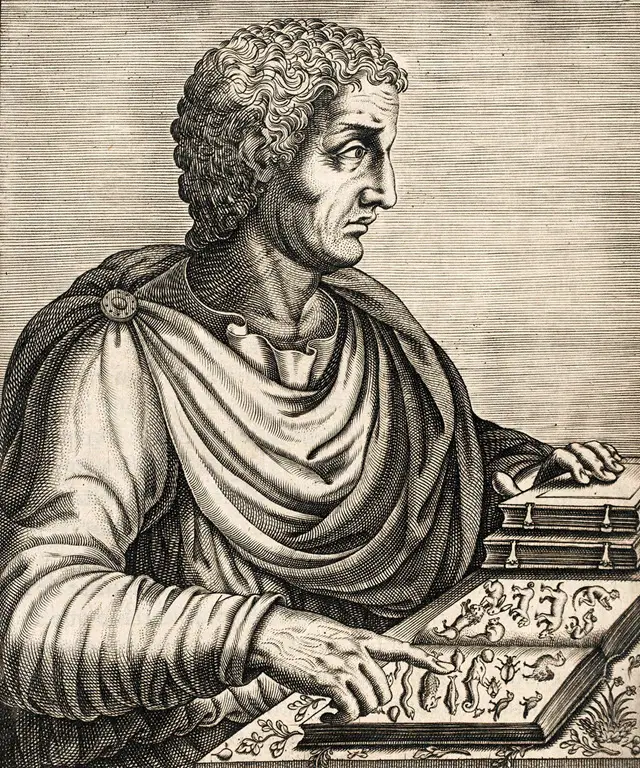
Pliny was born to an elite family in Como, Italy but later descended to Rome and completed his education.
Even though scrapes of his previous discussions survive, only Natural History exists as a solid compiled book. The book delves into numerous states of natural things.
The book includes 37 parts, each part narrating his observations on cosmopolitan topics beginning from cosmology and astronomy (Book II), humans (Book VII) to reptiles AND mammals (VIII), fishes and other marine animals (IX), BIRDS (X) and insects (XI).
While some parts of the book report excerpts from Aristotle’s logic, there were many incidences of independent examination by Pliny. Thus, assembling his observations and studies on various branches of botany, he prepared a comprehensive book that was accessible both in Rome and Italy.
6. Porphyry (AD 233- 305)
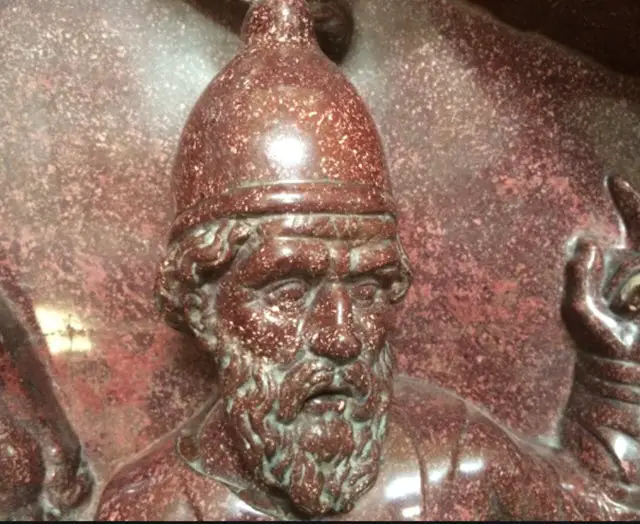
Porphyry of Tyre was a disciple of Plotinus, the Neoplatonic philosopher. Of all his other contributions, the most significant is the publication of the manuscript of his teacher, Plotinus, called Enneads posthumously.
Born in Lebanon (older Phoenicia) at circa 233-234 AD, his name was Malchus. He later visited Rome and became acquainted with his teacher.
To talk about his original works, he has penned on cosmopolitan topics. Isagoge or Introduction was translated in Latin and Arabic, which was a staple book among the teachers during the Middle Ages.
Moreover, Philosophy from Oracles and Against the Christians irked the followers of Christianity and sparked a controversy.
Besides these, his most famous book is Introduction to Categories, where he has briefly expounded on the ideas of Aristotle.
He opposed Christianity and defended Paganism, citing that Christianity was, unnecessarily, placed on a high pedestal. He hated the very theme of Christianity and impersonal God. He believed that only by imbibing the confluence of wisdom and reason could one be united with God.
He advocated vegetarianism and discussed the effect of eating animal meat in his book, On the Impropriety of Killing Living Beings for Food. He also authored a book on Pythagoras (Life of Pythagoras) besides the one on Plotinus. He has worked to preserve the life, struggles and achievements of various philosophers and mathematicians that history might have lost otherwise.
5. Plotinus (205-270)
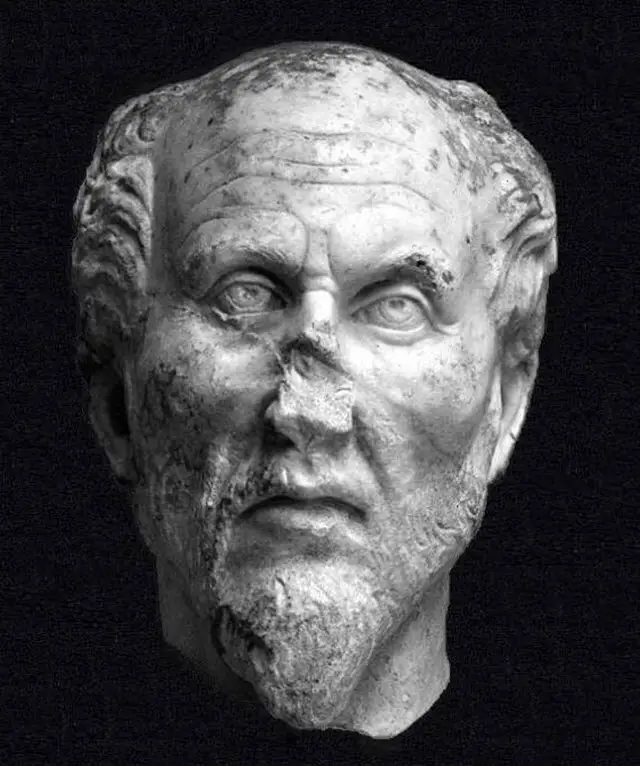
Plotinus was an ancient philosopher and the father of Neo-Platonism. The sources of his biography are limited to a handful of books published by his disciple. Books such as The Life of Plotinus and Enneads are some of them.
Unfortunately for us, any information regarding his life is unavailable while extant sources recount a six-year-long acquaintance between Plotinus and Porphyry. Hence, most of his life is oblivious to history.
Plotinus was a devoted teacher and later in his life, took many refuges in writing. His congregation was not any different than the traditional schooling prevalent at that period. Activities such as citing personal views on the existing ideas of philosophers preceding him was a common phenomenon. Similarly, he entertained inquiries and discourses on various subject matters and pursued them until he propounded a definite answer.
Like most philosophers of late antiquity, he believed in magic and the prophecies of the constellations. His final message corroborates his interest in the occult, which was to strive to become inherently Divine.
4. Saint Augustine (354-430)
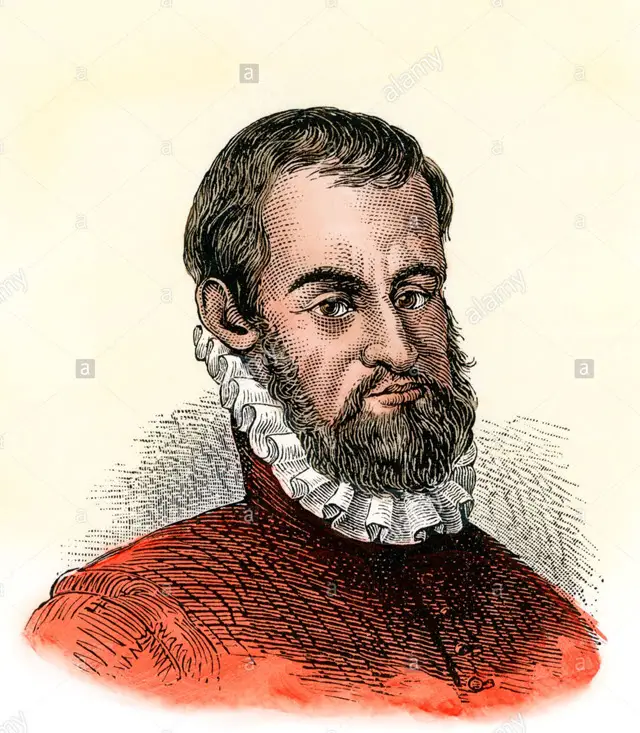
Saint Augustine of Hippo was a philosopher, Christian thinker, and more importantly, a theologian. He successfully attempted to mesh Classical and Christian doctrines, consequently birthing a more powerful genre of theology.
Not only that, through his books like Confessions and City of God, he also introduced the exegesis of religious texts while also consolidating the architecture of Christianity in both the Middle and Modern Ages.
The resurgence of The Confessions after the 12th century made a lasting impact on the readers. It portrays the trials and tribulations of man in a quest for self-knowledge in the presence of an all-pervading God. He neatly categorizes confessions as all acts approved by religion like appreciating God and outspokenly claiming faith in Him. The Confessions is more like a prayer, an exhortation to turn inwards and bask in the love of God.
His narratives mostly revolve around sin, salvation, God, and soul. He opines that religion is not merely a matter of the intellect but disciplined renunciation of anything carnal. Thus, he gave up his life striving for a religious crusade against all pleasures of the flesh and inspiring to live a chaste life.
3. Marcus Aurelius (121-180)
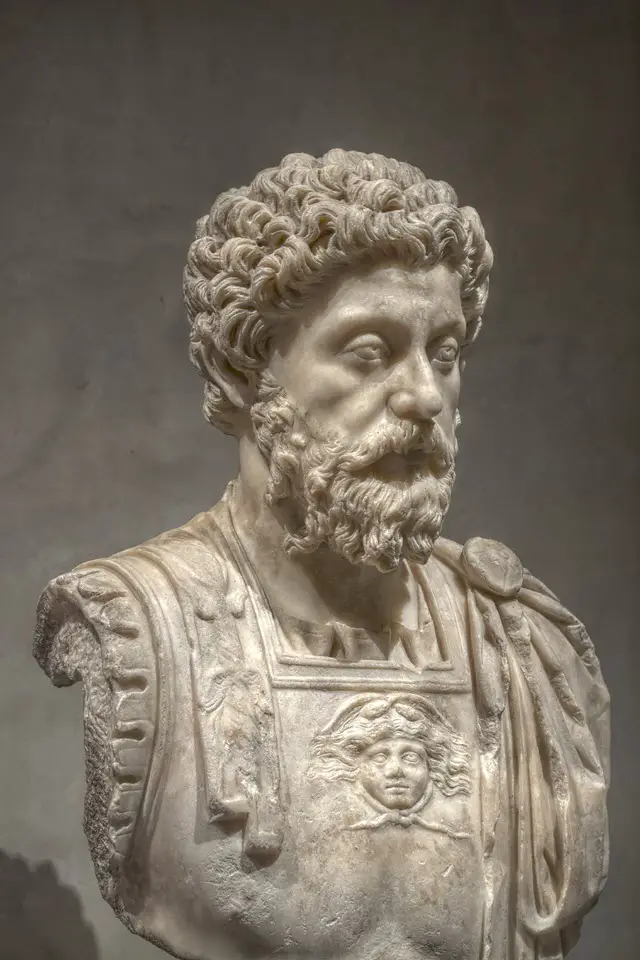
Marcus Aurelius Antoninus was a Roman emperor and the author of the Meditations, a work of Stoic philosophy.
Born into a wealthy and politically active family, he ascended the throne and proved to be an able and most respectable emperor. He is mostly known for availing his ingenuity in all crises and his tactical retaliation in warfare. But most importantly, he is known for authoring Meditations and subsequently consolidating Stoicism.
His book consists of his musings, anecdotes, and reflections amidst fervently campaigning and waging war against the barbarians. It is an elucidation of Stoicism, the philosophy of controlling things within our purview and letting go of anything depending on foreign bodies. His narration paints a clear picture of a dutiful emperor, unconcerned with either transient or lasting fame.
In totality, it reflects what constitutes a Roman emperor and the zeitgeist. The fact that he originally wrote in Greek stands as a testimony to the merging of Greco-Roman culture.
His book is relevant to all ages and all eras. However, people are most likely to fall prey to it during modern times. It is an elucidation of Stoicism, the philosophy of controlling things within our purview and letting go of anything depending on foreign bodies. His narration paints a clear picture of a dutiful emperor, unconcerned with either transient or lasting fame.
Thus, he is credited to have simplified Stoicism, while the book is owned by most people today (including myself), which best placates us during the throes of agony that modern-day complexities yield.
2. Seneca the Younger (c. BCE 4- 65 AD)
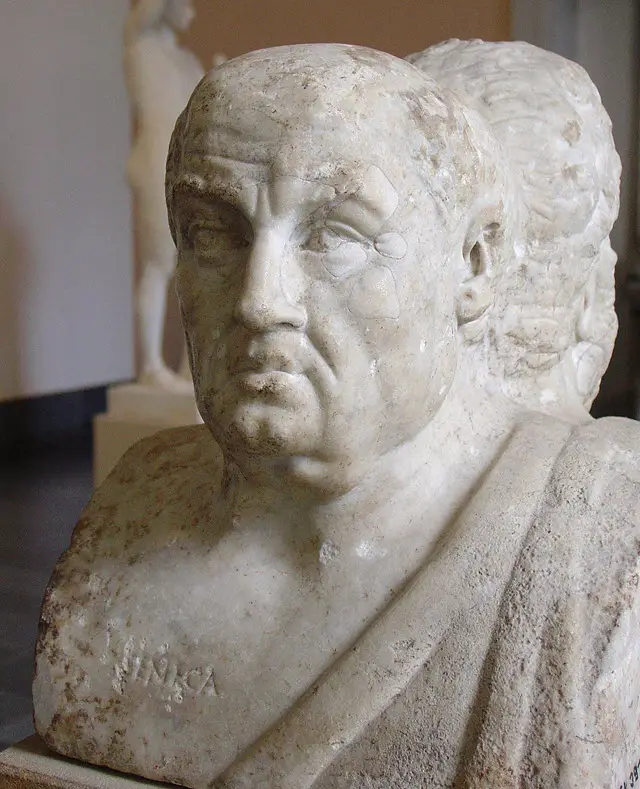
Lucius Annaeus Seneca the Younger was a Roman politician and philosopher. He was born around 4 BCE. He was sickly for much of his life and on three occasions did the Emperors or the Senate try to have him killed. When he finally killed himself, it took three tries. Ironically, it was an illness that kept him alive.
During his life, Seneca was a champion of the school of philosophy known as Stoicism. Though it originated in Greece, it was quite popular in Rome. Unlike many of the philosophers, Seneca did not heed what he advocated. Despite arguing, as the stoics did, that poverty was not evil or something to avoid, he was one of the richest men in the world.
Seneca espoused the good of private life in place of a public one but was very involved in the public sphere. He claimed that we should live virtuously, and yet he was often the center of a scandal in Rome.
That said, Seneca did offer persuasive arguments in favor of Stoicism. While the original Stoics were also concerned with logic, metaphysics, and epistemology to support a full philosophical framework, his work focused primarily on their ethics. His arguments read more like advice for life than claims about the nature of reality.
He argued passionately against the dangers of anger and other emotions while claiming that virtue and simplicity were the way to a good life. Even if his arguments were not always valid, the persuasive style was convincing and powerful. Thus, heralding him as the teacher of the emperor and defender of Roman Stoicism.
1. Cicero (BC 3- 43)
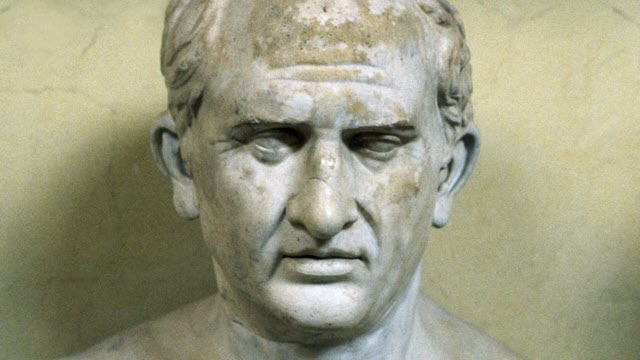
Marcus Tullius Cicero was a dedicated citizen of the Roman Republic. By the time he reached its highest office, that of consul in 63 BCE, it was an institution that had lasted over 500 years. Cicero was one of its last defenders.
He penned his most influential book De Officiis or On Duties at the height of conflict over the future of the Republic. Cicero had refused to join the alliance between Julius Caesar, Crassus, and Pompey, and even pleaded with Caesar to preserve it.
In his book, he makes direct attacks on those like Caesar and Mark Antony who were corrupting what he saw as the foundational principles of the Roman Republic; primarily the sense of civic duty which lay at its foundation.
For Cicero, we should fix our gaze on the benefit of the Republic, not on ourselves. We are obliged to human fellowship over and above and others. Furthermore, and importantly, for later thinkers, Cicero suggested that in working out what our job is, we should always assume that the noble and honorable action is the same as the useful or profitable one; no dishonesty can ever lead to the good of the Republic.
Unfortunately, a year after writing The Officiis, Cicero is captured by Octavian troops and killed.
The Roman Republic might have died soon after Cicero yet his ideas lasted long after. The rediscovery of his texts in the Renaissance became the foundation for a new movement, humanism. Thus, establishing a legacy posthumously that is still widely espoused in the world.
Conclusion
Bertrand Russell has rightly stated that no Roman philosopher is an original but borrowed from the Greeks, for it is Greek philosophy dressed in Roman. Everything that the Romans advocated is mere expounding on Greek templates.
In conclusion, Roman philosophers expounded on the Greek template and carried the baton of epistemology, ethics, and logic an era forward, comprising altogether as the Western Philosophy.
